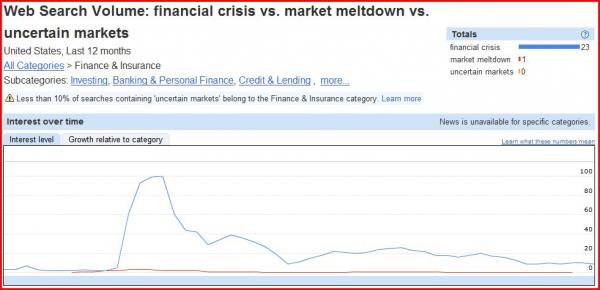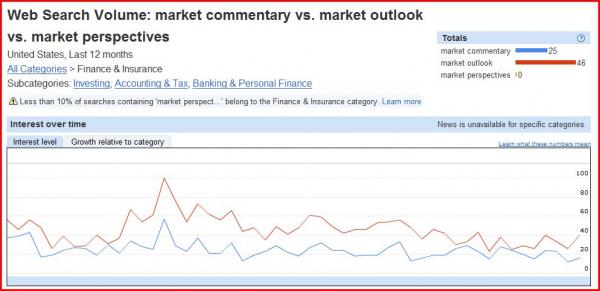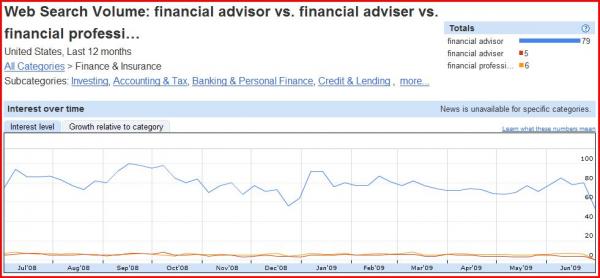Mind The Keywords—'Unfortunate Market Anomaly' Won't Help Search Traffic Find You
/ TweetSong selection. One of the maddening things about the American Idol competition is what consistently trips up the final 12. Their raw talent or personality gets them just so far but those who “go home early” fail to read the judges’ minds about the songs they should be singing.
Word selection. That’s the ground on which Web sites compete for search traffic. But unlike with the Idol wanna-bes, there’s no need to guess. There are ways to know which keywords drive traffic. The challenge for the leader of digital strategy at mutual fund, exchange-traded funds (ETFs) and other asset management companies is in persuading colleagues to use the more commonly used terms when they create content.
Amateur performers on Idol have youth and inexperience as their excuse for ignoring the judges' cues. But professional communications today need to cede to the easy-to-track "wisdom of the crowds.”
Journalists years ago agreed to follow the Associated Press style, and book publishers mostly conformed to the Chicago Manual of Style. But even companies that adopted either the AP or Chicago style tended to produce their own addendums documenting the instances when they wanted to deviate from common practice. Words are invented, hyphens are attached with abandon, spelling reflects individual manager’s preferences and then gets institutionalized. Nobody picks this bit of muscle-flexing as a battle that’s worth fighting.
But there’s a price to be paid for spelling and word idiosyncrasies, and your Web site traffic, your content, pays it. This is inadvertent, of course, and that’s why it’s up to you to point it out. Asset managers are publishers now and need to think of their readers.
We're going to take a look at a few generic examples but it's a safe bet that you have your own sacred cows worth toppling. Granted with the examples below, you can expect your content to be competing for attention in search results with serious heavy-hitters who publish more often than you do. Page 1, position 1 on Google may not be a realistic goal. At the very least, you want to make it possible for the people who are searching for Your Company Name + Generic Term to find the content they expect you to have. Especially since you probably do even if you call it something funky.
We reviewed the following using Google Insights for Search, limiting the search to the last 12 months, from within the U.S. and in the Finance and Insurance categories. You could also refer to the Google AdWords Keyword Tool, which will show you information about traffic and advertiser competition on your keywords as well as provide data on related keywords.
Example 1: “Unfortunate market anomaly,” "market meltdown," "uncertain markets" all might have been how your investment team preferred to refer to the recent financial crisis but that’s not how the rest of the world thought about it or—more to the point—searched for information about it. Companies that conformed by using “financial crisis” in their work had more takers. Those that shied away from the term were irrelevant.
Example 2: How do you refer to the narratives that present your company’s view of the financial markets? Years ago when I was a journalism school intern working at my first newspaper job, my editor published a column called "Looking Around with Orv." Does your narrative have a similarly precious title? Your Orv may not like it but it’s time for a change.
Here's your decision, though: Not all but most investment management companies seem to be settling on "market commentary." But look what people are searching for—more "outlook" than "commentary." What you call yours should reflect what it offers but if you're leaning toward "outlook," here's some data to start the conversation about expanding the scope of the content.
Example 3:There’s an abundance of high-value content on the Web today, and luckily there are several monitoring tools (e.g., Google alert) that enable people to keep up. When people set alerts, they’re not thinking of your company—they’re made aware of your content only when what you publish matches the terms they’re on the look-out for. That’s the argument for using common terms like "financial advisor" with an "o" and not an "e." "Financial professional" or "investment professional" are umbrella terms that appeal to marketers because they are not distribution channel-specific but they’re non-starters in search.

As I write this on July 1, just a few days from Independence Day, I can anticipate writers feeling that writing for search engines represents a loss in freedom of expression. I get that.
I remember conversations that I’ve had with journalists while recruiting them for marketing communications jobs. The transition to marketing does represent a compromise, not all of the words you first put down “on paper” are likely to survive the routing process. But for what you trade away, you gain in having a role in using your communications ability to advance a business. There’s a rush in that, in knowing that your content—including the words you chose purposefully—is succeeding in attracting information-seekers to your company. That’s what this is about. Findability isn’t every writer’s top priority, but it must be for a business communicator today.
Happy Fourth of July to our U.S.-based readers. Rock The Boat is goin’ fishin.




